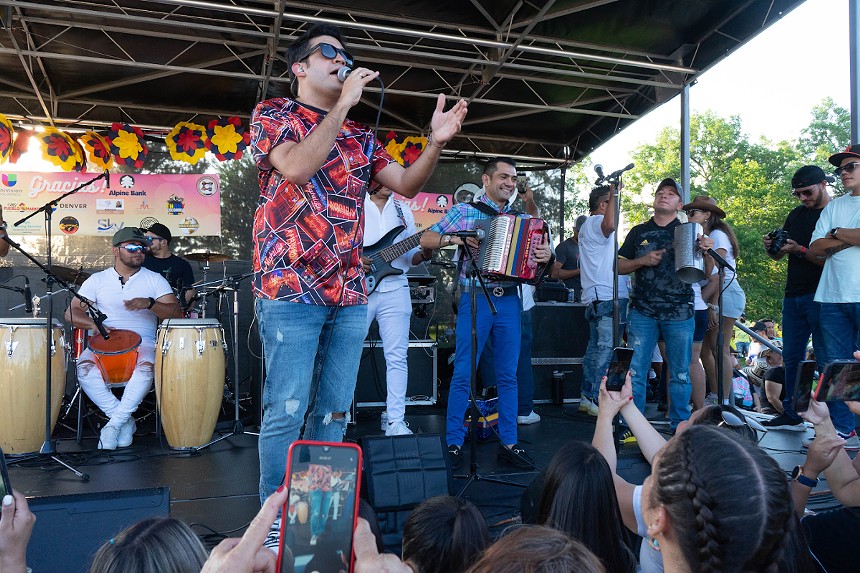The event is scheduled to start at Pulaski Park on East Bayaud Avenue — near the Cherry Creek Shopping Center — on Sunday, July 23, at around 11 a.m. and will run until 7 p.m., according to organizers.
The festival honors Colombian Independence Day, which falls on July 20, and will host more than twenty food vendors serving up Colombian classics like sanocho, carne oreada, bandeja paisa and chicharrones.
Local orchestras and bands are set to provide the music, with salsa and cumbia performances slated throughout the day — both of which originated in Colombia. Pop and reggaeton will also be played.
Fans of the Colombian clothing style, meanwhile, can pick up handmade clothes, jewelry and art at the festival’s many shopping booths.
“The Colombian Festival is a platform to support small, local businesses,” says Xiomara Sánchez, the president of the Colombian Foundation in Colorado, which hosts the event. “It’s also a way to get to know the traditions and cultural practices [and to] promote and build the Colombian culture [in Colorado].”
Describing the festival shopping stands,Sánchez tells Westword: “The booths that will be there are obviously going to have Colombia gastronomy and Colombian products. The main thing about these festivals is that [Colombian] people can enjoy the little things that they can’t do because they’re far from home. These festivals give us that opportunity. “
Colorado houses about ten thousand Colombian-born citizens within its borders, according to the most recent U.S. Census data. The Independence Festival brings in about three to five thousand people each year, Sánchez estimates, and many of them don gold, blue and red — the colors on the Colombian flag — with soccer jerseys, sombreros and dresses.
Over the past two decades, Sánchez has seen the Colombian community blossom after moving to the Mile High City from Cali, Colombia. “If I talked to you about being Colombian in Colorado 21 years ago, and about being Colombian now, the answer would be very different,” she says. “Twenty one years ago, [the culture] was very difficult to find — or simply there was no Colombian restaurant.”
Sánchez is excited about the Independence Festival hosting new and popular establishments this year, like LaTinto Cafe on South Broadway, Antojitos Colombianos — a longtime east Denver staple for local Colombians — and Los Parceros, which is now in Aurora after spending several years on East Colfax.
While the Colombian Foundation in Colorado is aware that it’s not the only Latin American community in metro Denver, it tries to share its space with food vendors from other Latin American countries, including “Venezuelan food vendors, Mexican food vendors, El Salvadorans,” Sánchez says.
“The majority of the food vendors are Colombian, but this is a festival that opens itself up to different cultures,” she tells Westword. “It’s a festival where we celebrate Colombian culture and other communities, and it’s open to any one who wants to spend the day outside enjoying Colombian culture and learning about others.”
Establishments from other countries being featured on Sunday include Dos Mares, an Aurora restaurant serving Panamanian cuisine, Arepas Queen, which is Venezuelan, and the Mexican restaurant Tacontento & Mas on West Mississippi Avenue. Some of the artisan shops that will be in attendance include Curvas Doradas, a clothing store in Aurora — Mar Assesorios, which sells jewelry, and Sanchely Sports, known for its soccer jerseys.

The 2023 Colombian Independence Festival will offer cumbia and salsa music as well as the best cuisine from the South American country like arepas and empanadas.
Courtesy of Xiomara Sánchez
The Independence Festival started in 2015 “with a group of Colombians who wanted to get together” after a previous festival for Colombian Independence “was canceled and didn’t come back,” Sánchez says. The event started out small, but has continued to grow over the years.
“We got together at that time to make it happen,” Sánchez says.”And at that time we were able to make it happen with a very small format, but the turnout was very large. From that point on, we took leadership to keep doing this festival.” In 2020 and 2021, the event was cancelled because of the pandemic. But things picked right back up in 2022.
The Colombian Foundation ultimately grew out of the festival, as it was established in 2019 — four years after its inception — by the same organizers who helped start the event. The group relies heavily on volunteers and donations from local businesses. There’s also an emphasis placed on finding great sponsors,Sánchez says. “Whenever we have an event, we draw on partners in the community to make it happen,” she tells Westword.
When it’s not hosting the festival, the Colombian Foundation in Colorado puts on events like educational workshops in Spanish — to help people with things like immigration or how to raise children — as well as charitable events, like Christmas giveaways. The group works with the Colombian consulate in San Francisco to announce when their officials visit Denver, which gives Colombian immigrants a chance to apply for visas, citizenship or to send money back home.
Sánchez sees the strongest Colombian presence in Denver and Aurora. The Mile High City has about 1,700 Colombian-born residents in its limits, while roughly 5,300 live across the metro area. More than five hundred Colombians are believed to be in Aurora. Colorado Springs, meanwhile, boasts a population of about 1,300 Colombia natives.
“Colorado is a state that welcomes immigrants,” Sánchez says. “It’s a cozy state to live in, and we’re not a state that rejects people from other communities or with different backgrounds. I think that’s why Colorado is a place that various people choose to live in.”
Stay connected with us on social media platform for instant update click here to join our Twitter, & Facebook
We are now on Telegram. Click here to join our channel (@TechiUpdate) and stay updated with the latest Technology headlines.
For all the latest For Top Stories News Click Here
